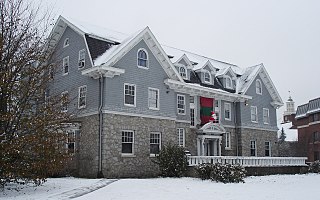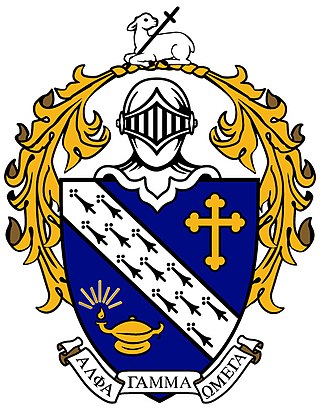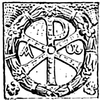
North American fraternity and sorority housing refers largely to the houses or housing areas in which fraternity and sorority members live and work together. In addition to serving as housing, fraternity and sorority housing may also serve to host social gatherings, meetings, and functions that benefit the community.

Alpha Gamma Omega is an American Christian fraternity. It was founded in 1927 at University of California, Los Angeles and now has chapters at universities in California, Colorado, North Carolina, Pennsylvania, and Virginia.
Dartmouth College is host to many fraternities and sororities, and a significant percentage of the undergraduate student body is active in Greek life. In 2005, the school stated that 1,785 students were members of a fraternity, sorority, or gender-inclusive Greek house, comprising about 43 percent of all students, or about 60 percent of the eligible student body. Greek organizations at Dartmouth provide both social and residential opportunities for students and are the only single-sex residential option on campus. Greek organizations at Dartmouth do not provide dining options, as regular meal service has been banned in Greek houses since 1909.
Sigma Alpha (ΣΑ) is a professional agricultural sorority.
Professional fraternities, in the North American fraternity system, are organizations whose primary purpose is to promote the interests of a particular profession and whose membership is restricted to students in that particular field of professional education or study. This may be contrasted with service fraternities and sororities, whose primary purpose is community service, and social fraternities and sororities, whose primary purposes are generally aimed towards some other aspect, such as the development of character, friendship, leadership, or literary ability.
While the traditional social fraternity is a well-established mainstay across the United States at institutions of higher learning, alternatives – in the form of social fraternities that require doctrinal and behavioral conformity to the Christian faith – developed in the early 20th century. They continue to grow in size and popularity.

Sigma Alpha Omega (ΣΑΩ) is an American non-denominational Christian sorority for women, founded at North Carolina State University on January 5, 1998. However, they can trace their roots back to the once co-educational Chi Alpha Omega fraternity founded at East Carolina University in 1987. The sorority was formed after a vote of active members at the NCSU chapter in 1998 and focuses on setting good moral examples for their peers and their community.
While most of the traditional women's fraternities or sororities were founded decades before the start of the 20th century, the first ever specifically Christian-themed Greek Letter Organization formed was the Kappa Phi Club, founded in Kansas in 1916. Kappa Phi was a women's sisterhood that developed out of a bible study and remains one of the largest nationally present Christian women's collegiate clubs today. Later organizations added more defined social programming along with a Christian emphasis, bridging the gap between non-secular traditional sororities and church-sponsored bible study groups, campus ministries and sect-based clubs and study groups.
Fraternities and sororities exist for high school students as well as college students. Like their college counterparts, most have Greek letter names. Although there were countless local high school fraternities and sororities with only one or two chapters, many secondary fraternities founded in the nineteenth and twentieth centuries in the United States grew into national organizations with a highly evolved governing structure and regularly chartered chapters in multiple regions. Many of the local chapters of these national fraternities were not tied to individual high schools but were instead area-based, often drawing membership from multiple high schools in a given area.
The expansion of Greek letter organizations into Canada was an important stage of the North American fraternity movement, beginning in 1879 with the establishment of a chapter of Zeta Psi at the University of Toronto. In 1883, the same fraternity established a chapter at McGill University. Other early foundations were Kappa Alpha Society at Toronto in 1892 and at McGill in 1899, and Alpha Delta Phi at Toronto in 1893 and at McGill in 1897. The first sorority, Kappa Alpha Theta, was established in Toronto in 1887. In 1902, the first international chapter of Phi Delta Theta was established at McGill University as the Quebec Alpha.

Fraternities and sororities at the University of Virginia include the collegiate organizations on the grounds of the University of Virginia in Charlottesville, Virginia. First founded in the 1850s with the establishment of several fraternities, the system has since expanded to include sororities, professional organizations, service fraternities, honor fraternities, and cultural organizations. Fraternities and sororities have been significant to the history of the University of Virginia, including the founding of two national fraternities Kappa Sigma (ΚΣ) and Pi Kappa Alpha (ΠΚΑ).





